



Pig outlook — Lean hog futures showing signs of market bottom in place
Livestock analyst Jim Wyckoff shares swine news from around the globeFebruary lean hog futures prices this week pushed to a six-week high and produced a technically bullish upside “breakout” from the trading range at lower price levels. That’s a technical clue that a market bottom is in place and that prices can trade at least sideways, if not sideways to higher in the near term. Fundamentally, US wholesale pork prices rose Wednesday. Cutout gains were driven by gains in all cuts except ribs. Wholesale pork has risen to the highest level since late November, further indicating cash hog and hog futures lows could be in place. The latest CME lean hog index rose 9 cents to $65.83 as of Jan. 8.
China to sell pork from state reserves
China will release 30,000 MT of frozen pork from state reserves on Jan. 10. Late last year, China made a series of pork purchases to support declining hog prices.
Philippines extends reduced pork tariffs, boosting U.S. exports
The President of the Philippines, Ferdinand Marcos Jr., signed an executive order extending the reduced tariff rates on imported pork for the third consecutive year. The in-quota duty will remain at 15%, and the out-of-quota rate will be 25%. These measures were initially implemented in May 2021 in response to an African swine fever (ASF) outbreak, which led to a pork shortage in the country. The Philippines had lowered import duties from 30% and 40% and increased the minimum access volume (MAV) to 254,210 metric tons (MT) from 54,210 MT.
This policy has significantly boosted U.S. pork exports to the Philippines, reaching a record of $205 million in 2021, representing a nearly 79% increase. However, after the increased MAV expired in January 2022, exports decreased to just under $135 million that year, with an estimated value of about $120 million in 2023. Despite the drop, these figures remain higher than historical levels.
Of note: The Philippines is a significant market in Asia with a population of over 109 million people who have a cultural preference for pork. The lowered tariffs have played a key role in driving increased U.S. pork exports to the country, making it one of the top 10 markets for American pork products.
Triumph Foods has not withdrawn its lawsuit challenging Massachusetts' state animal welfare law known as Question 3 (Q3)
This law mandates that pork sold in Massachusetts must meet certain animal welfare standards that came into effect on Aug. 24. Triumph Foods alleges that Q3 violates the Commerce Clause and other provisions of the U.S. Constitution. While a judge has already dismissed several parts of Triumph's lawsuit, Massachusetts is now seeking to have the remaining claim thrown out, arguing that Triumph has no legal standing since all sales of its pork products are controlled by Seaboard Foods under an agreement dating back to 2004. However, Triumph contends that the state's argument is irrelevant, as the law broadly prohibits anyone involved in the sale of pork products and clearly applies to them.
Controversial pig antibiotic remains in U.S. food supply
Eight years ago, U.S. regulators acknowledged a mistake regarding an antibiotic called carbadox that was approved for use in pigs in 1972. This drug, which is administered to animals Americans consume as lunchmeat and hot dogs, is now raising concerns about potential carcinogenic residues, according to a Bloomberg account. Originally, regulators believed that the residues of carbadox wouldn't pass on to humans and pose a cancer risk. However, in the early 2000s, an international committee found flaws in the testing method used to make this assumption. The U.S. Food and Drug Administration (FDA) confirmed the same in 2016.
Despite evidence that removing carbadox from the market would reduce consumers' lifetime cancer risk, the drug is still in use in the US. Carbadox is banned in Europe and Canada, but Phibro Animal Health Corp., which sells it as Mecadox, has resisted efforts to withdraw it from the market.
In November, the FDA announced plans to revoke the testing method used to determine carbadox residues' impact on humans and withdraw approval for the drug. Although this isn't the FDA's first attempt to remove carbadox, it's part of a lengthy process. Phibro continues to assert the safety of carbadox.
While the FDA's recent move suggests readiness to eliminate carbadox from the food chain, Phibro is expected to challenge this decision, potentially prolonging the process. The FDA hasn't explicitly advised against eating pork during this period but suggested alternative protein sources.
The next week’s likely high-low price trading ranges:
February lean hog futures--$67.00 to $75.00 and with a sideways-higher bias
March soybean meal futures--$350.00 to $385.00, and with a sideways-lower bias
March corn futures--$4.47 to $4.75 and a sideways-lower bias
Latest analytical daily charts lean hog, soybean meal and corn futures










